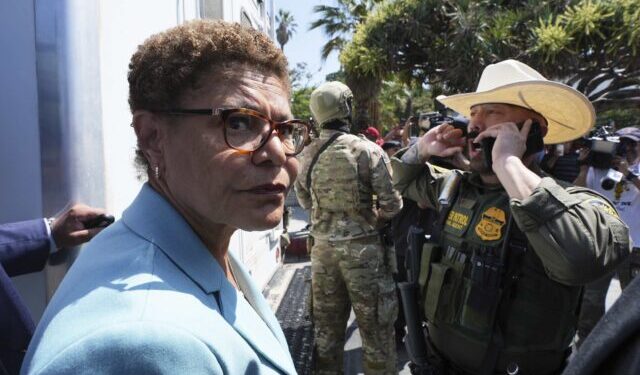Six months after the devastating Palisades Fire scorched homes and disrupted countless lives, Los Angeles Mayor Karen Bass had a clear opportunity to show up for her city. Instead, she chose political theater over public duty.
Mayor Bass abruptly canceled her appearance at a scheduled event commemorating the six-month anniversary of the Palisades and Eaton Fires—a solemn gathering attended by California Governor Gavin Newsom, Senator Alex Padilla, and other top officials. But while residents gathered to honor first responders and seek accountability for stalled rebuilding efforts, Bass was nowhere to be found. Her absence was officially brushed off as due to an “emergent event.”
That “emergent event” turned out to be an Immigration and Customs Enforcement (ICE) raid, which Bass chose to personally protest.
Bass’s decision to skip the fire memorial in favor of confronting ICE isn’t just symbolic—it’s a window into where her administration’s priorities lie. At a time when crime is rising, the homeless crisis is spiraling, and fire recovery is slow-moving, the mayor has made it a point to show up not for residents, but to stand against federal immigration enforcement.
This isn’t new behavior. Bass has spent more of the city’s budget on programs for the homeless—many of which lack oversight or results—than on basic public safety, including firefighting. Under her leadership, the city’s focus has drifted from essential services to progressive activism.
Despite her pledge not to travel abroad while in office, Bass was out of the country during the Palisades Fire. The broken promise went largely unaddressed, much like the city’s ongoing delays in helping fire victims rebuild. Even Governor Newsom recently admitted that local permitting delays are holding up reconstruction efforts—a process that falls under Bass’s jurisdiction.
Bass’s growing alignment with anti-ICE protests isn’t just controversial—it’s actively antagonistic toward law enforcement. These same protests have repeatedly targeted the Los Angeles Police Department and federal officers alike. Rather than standing by the men and women tasked with keeping Angelenos safe, Bass has embraced the narrative that law enforcement is the problem—blaming President Trump for riots in the city and suggesting the unrest would stop only if ICE raids end.
That rhetoric, coupled with the city’s “sanctuary” stance, has drawn legal action. The Department of Justice recently filed suit against Los Angeles, arguing the city’s policies violate federal law and discriminate against federal enforcement efforts.
As she gears up for re-election, Bass appears to be making a strategic bet: that appeasing the far-left base will secure her political future. But for families still reeling from fire damage, law-abiding residents watching crime rise, and first responders who expect support from City Hall—not protests—the message is clear: they are not the priority.
When your mayor skips a fire memorial for a photo-op at an ICE protest, it’s not just a scheduling conflict. It’s a statement of values. And in this case, it’s one that leaves too many Californians behind.




















